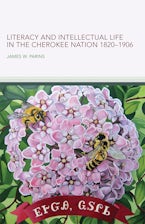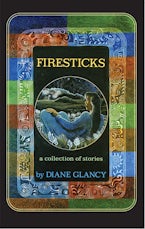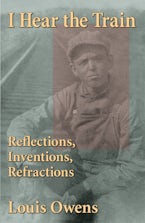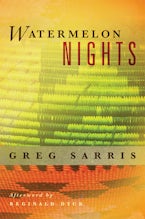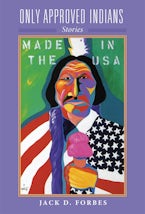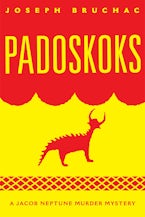American Indian Literature and Critical Studies Series

About The Series
Original manuscripts and reprints, including original novels, edited collections of short stories, imaginative interpretations of tribal myths, and the reexpression of traditional tribal stories in modern or urban situations. Original fiction includes contact and conflict themes, crossblood and urban tribal identities, and the mythic verism of tribal experiences and cultural encounters. Critical studies include a wide range of comparative and theoretical interpretations of American Indian authors and literatures, including trickster discourse, new interpretations of myths, critical studies of oral traditions, the problems of translation, critical biographical studies, and comparative studies of tribal literature and the literature of other cultures and nations.
Showing results 1-10 of 58
Filter Results OPEN +

Literacy and Intellectual Life in the Cherokee Nation, 1820–1906
Many Anglo-Americans in the nineteenth century regarded Indian tribes as little more than illiterate bands of savages in need of “civilizing.” In Literacy and Intellectual Life in the Cherokee Nation, 1820–1906, James W. Parins traces the rise of bilingual literacy and intellectual life in the Cherokee Nation during the nineteenth century—a time of intense social and political turmoil for the tribe.
The Mask Maker
In The Mask Maker, Glancy provides the reader with intriguing new ways of looking at identity, at language, at intangible values, and at love. This captivating novel on the human need for self-expression will delight readers of all ages.
Firesticks
A Collection of Stories
Incorporating elements of fiction, nonfiction, drama, and poetry, Diane Glancy’s stories are lyrical yet down to earth, often tough and gritty. Experimental, sometimes surreal in form, they...
I Hear the Train
Reflections, Inventions, Refractions
In this innovative collection, Louis Owens blends autobiography, short fiction, and literary criticism to reflect on his experiences as a mixedblood Indian in America. In sophisticated...
Native Removal Writing
Narratives of Peoplehood, Politics, and Law
Placing novels in conversation with nonfiction writings, Native Removal Writing ranges from texts produced in response to the legal and political struggle over Cherokee Removal in the late 1820s and 1830s, to works written by African Cherokee writers dealing with the freedmen disenrollment crisis, to contemporary speculative fiction that links the appropriation of Native intangible property (culture) with the earlier dispossession of their real property (land).
Watermelon Nights
First published in 1998, Watermelon Nights remains one of the few works of fiction to illuminate the experiences of urban Native Americans and is the only one to depict the historical conditions that shape a tribe’s rural-to-urban migration.
Briefcase Warriors
Stories for the Stage
In Briefcase Warriors, a collection of six fast-paced, thought-provoking plays, E. Donald Two-Rivers presents an intricate and multifaceted view of contemporary American Indian urban life. Alternately sad, humorous, or discomfiting, these plays range from one-act vignettes accessible to young adults to extended portrayals of the seedier side of urban existence.
Only Approved Indians
Stories
In these short stories, Jack D. Forbes captures the remarkable breadth and variety of American Indian life. Drawing on his skills as scholar and native activist, and, above all, as artist, Forbes enlarges our sense of how American Indians experience themselves and the world around them.
Padoskoks
A Jacob Neptune Murder Mystery
Like Chenoo, the first in the Jacob Neptune series, Padoskoks has an explosive start and keeps gathering speed, giving readers a glimpse of the ancient wisdom and Native customs swirling just under the surface as the action-packed plot barrels toward its natural, if startling, conclusion.
Twenty Thousand Mornings
An Autobiography
When John Joseph Mathews (1894–1979) began his career as a writer in the 1930s, he was one of only a small number of Native American authors writing for a national audience. Today he is widely recognized as a founder and shaper of twentieth-century Native American literature. Twenty Thousand Mornings is Mathews’s intimate chronicle of his formative years. In her insightful introduction and explanatory notes, Susan Kalter places Mathews’s work in the context of his life and career as a novelist, historian, naturalist, and scholar. Kalter draws on his unpublished diaries, revealing aspects of his personal life that have previously been misunderstood. In addressing the significance of this posthumous work, she posits that Twenty Thousand Mornings will "challenge, defy, and perhaps redefine studies of American Indian autobiography.”

Literacy and Intellectual Life in the Cherokee Nation, 1820–1906
Many Anglo-Americans in the nineteenth century regarded Indian tribes as little more than illiterate bands of savages in need of “civilizing.” In Literacy and Intellectual Life in the Cherokee Nation, 1820–1906, James W. Parins traces the rise of bilingual literacy and intellectual life in the Cherokee Nation during the nineteenth century—a time of intense social and political turmoil for the tribe.
The Mask Maker
In The Mask Maker, Glancy provides the reader with intriguing new ways of looking at identity, at language, at intangible values, and at love. This captivating novel on the human need for self-expression will delight readers of all ages.
Firesticks
A Collection of Stories
Incorporating elements of fiction, nonfiction, drama, and poetry, Diane Glancy’s stories are lyrical yet down to earth, often tough and gritty. Experimental, sometimes surreal in form, they...
I Hear the Train
Reflections, Inventions, Refractions
In this innovative collection, Louis Owens blends autobiography, short fiction, and literary criticism to reflect on his experiences as a mixedblood Indian in America. In sophisticated...
Native Removal Writing
Narratives of Peoplehood, Politics, and Law
Placing novels in conversation with nonfiction writings, Native Removal Writing ranges from texts produced in response to the legal and political struggle over Cherokee Removal in the late 1820s and 1830s, to works written by African Cherokee writers dealing with the freedmen disenrollment crisis, to contemporary speculative fiction that links the appropriation of Native intangible property (culture) with the earlier dispossession of their real property (land).
Watermelon Nights
First published in 1998, Watermelon Nights remains one of the few works of fiction to illuminate the experiences of urban Native Americans and is the only one to depict the historical conditions that shape a tribe’s rural-to-urban migration.
Briefcase Warriors
Stories for the Stage
In Briefcase Warriors, a collection of six fast-paced, thought-provoking plays, E. Donald Two-Rivers presents an intricate and multifaceted view of contemporary American Indian urban life. Alternately sad, humorous, or discomfiting, these plays range from one-act vignettes accessible to young adults to extended portrayals of the seedier side of urban existence.
Only Approved Indians
Stories
In these short stories, Jack D. Forbes captures the remarkable breadth and variety of American Indian life. Drawing on his skills as scholar and native activist, and, above all, as artist, Forbes enlarges our sense of how American Indians experience themselves and the world around them.
Padoskoks
A Jacob Neptune Murder Mystery
Like Chenoo, the first in the Jacob Neptune series, Padoskoks has an explosive start and keeps gathering speed, giving readers a glimpse of the ancient wisdom and Native customs swirling just under the surface as the action-packed plot barrels toward its natural, if startling, conclusion.
Twenty Thousand Mornings
An Autobiography
When John Joseph Mathews (1894–1979) began his career as a writer in the 1930s, he was one of only a small number of Native American authors writing for a national audience. Today he is widely recognized as a founder and shaper of twentieth-century Native American literature. Twenty Thousand Mornings is Mathews’s intimate chronicle of his formative years. In her insightful introduction and explanatory notes, Susan Kalter places Mathews’s work in the context of his life and career as a novelist, historian, naturalist, and scholar. Kalter draws on his unpublished diaries, revealing aspects of his personal life that have previously been misunderstood. In addressing the significance of this posthumous work, she posits that Twenty Thousand Mornings will "challenge, defy, and perhaps redefine studies of American Indian autobiography.”

